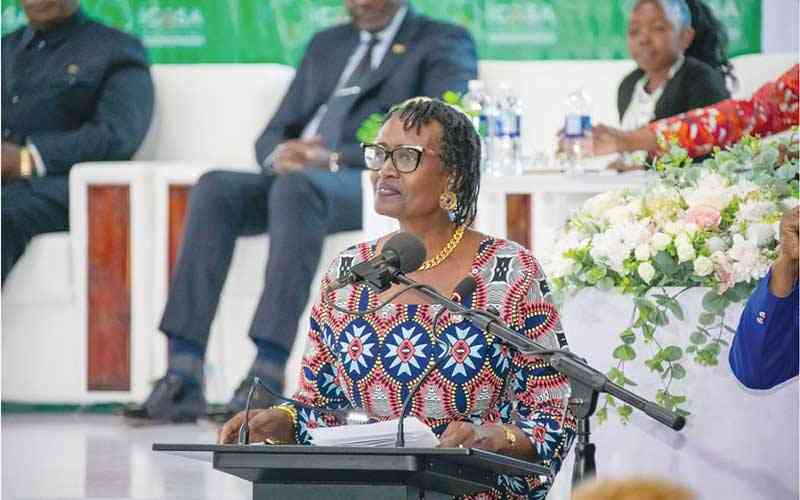Source: Health sector wobbles, again – The Zimbabwe Independent
Vaccine Alliance while the United Nations Children’s Fund, United Nations Population Fund and World Health Organisation are the technical partners.
The HRF is aligned with Zimbabwe’s National Development Strategy 1 and the NHS 2021-25. It will run until 2025.
Its objective is to consolidate the gains achieved under the Health Development Fund (HDF).
The fund will focus on three health pillars: ending preventable maternal, newborn, child and adolescent deaths; global health security; and health systems strengthening. It has a budget of approximately US$90 million.
Improvements were noted on maternal mortality, infant and under-five mortality, adolescent fertility, contraceptive prevalence and chronic malnutrition or stunting.
Maternal mortality ratio, for instance, reduced from 614 to 462 per 100 000 live births between 2014 and 2019.
Also, the HDF contributed to maintaining the availability of essential medicines and commodities in primary healthcare facilities at an average of 80%.
HRF aims to build on the gains of HDF and address the remaining challenges to ensure access to maternal, child and sexual and reproductive health and nutrition services, and to strengthen the health system’s resilience to shocks.
About 800 women die every day in east and southern Africa from preventable causes related to pregnancy and childbirth, according to recent data.
This is about one woman every two minutes.
Every woman who dies giving birth experiences injury and infection or disability.
Most of these deaths and injuries are preventable.
International Conference on Aids and STIs in Africa (Icasa)
Apart from hosting the International Conference on Population and Development, Zimbabwe also hosted another big regional event, Icasa, this month in Victoria Falls and in Harare.
A pre-event high-level meeting for African First Ladies preceded the event in Victoria Falls to kick-start the regional event, which was held in Zimbabwe for the second time.
Zimbabwe first hosted Icasa in 2015.
Speaking in Victoria Falls on the sidelines of the high-level meeting, Mombeshora expressed hope that the country’s HIV response will be enriched through exchanges and collaborations during the conference.
“Zimbabwe adopted the multi-sectoral approach to the response to HIV, which has always put communities first in driving the response, providing leadership, financing, monitoring and holding government and stakeholders accountable,” he said.
“Putting communities first, my ministry will prioritise interventions aimed at further reducing new infections and reducing deaths among people living with HIV, and ensuring that we maintain the epidemic control phase we have achieved.
“In doing this, we have to also increase attention to associated non-communicable diseases and improve the quality of life for people living with HIV.”
National Aids Council chief executive Bernard Madzima said the event came at a time when the country was upscaling efforts to end Aids by 2030.
“We have increased programming starting from the grassroots as we move towards the 2030 goals. As we host Icasa 2023, we look forward to getting more scientific interventions in that regard,” he said.
In his state of the nation address on the eve of World Aids Day, President Emmerson Mnangagwa said hosting the event twice in a decade, coupled with the country’s achievements in the HIV and Aids sector, was a great achievement.
“This is a major milestone in our quest to ramp up Zimbabwe’s reclamation of its influential position in world affairs,” Mnangagwa said.
“The conference, which we are proud to host for the second time in nine years, is a major platform for sharing and exchanging cutting-edge evidence and lessons in the response to HIV and other epidemics afflicting our continent and the world.”
Thousands from across the world graced the event which was a huge success.
UNAids executive director Winnie Byanyima, at the Icasa official opening, said: “Icasa is a moment for us to gather, to take stock of progress towards the 2030 SDG goal of ending Aids as a public health threat and to consider future directions and sustainability of the response.
“This meeting brings together so many inspirational leaders of the struggle to end Aids.
“Our war is against the HIV virus. The vanguard of our movement are people living with HIV. They are the activists who work everyday on the ground. That is the vanguard of our HIV movement.”
Overview
Community Working Group on Health executive director Itai Rusike said 2023 was a challenging year for the health sector.
“Zimbabwe continued to experience an outflow of highly skilled and experienced health professionals as the brain drain remains a public health problem,” Rusike said.
“Limited allocation of domestic resources to fund a health benefit that is accessible to all the people of Zimbabwe resulting in the majority of the people experiencing catastrophic health expenditures given that some of the diagnostic procedures and treatment services were not available in public health institutions such as cancer treatment like radiotherapy and chemotherapy sessions.”
Rusike said non-communicable diseases such as hypertension, cancer and diabetes remained a public health crisis in the country due to lifestyles and other economic and social factors.
“The shortage of ambulances was another challenge during emergencies as some of the districts were operating with only one or two ambulances despite the government having procured air ambulances that are not yet in use that resulted in people paying a lot of money for private ambulances or even unnecessary loss of lives during road traffic accidents,” he said.
“The shortages of drugs and diagnostics in our clinics and hospitals continues to affect the health seeking behaviours as some people don’t even bother to go to the health facilities where there are no drugs and equipment until their situation gets worse.”

COMMENTS